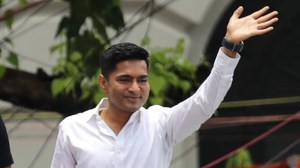Killing consensus
In these morally and politically fractured times, with ugly charges and counter-charges reverberating in the air, the one hope that India...

In these morally and politically fractured times, with ugly charges and counter-charges reverberating in the air, the one hope that Indian politicians had an agenda beyond themselves was hopelessly belied on the floor of the House on Wednesday. The special one-day Lok Sabha session to pass the general and railway budgets for 1999-2000, to be followed by a similar Rajya Sabha session, was convened after political parties across the spectrum agreed to pass the Bills without amendments or debate. It was a precious and tenuous peace entered into by ideologically disparate parties and seemed to herald a rare commitment to national interests. It had led commentators to hail it, albeit with a degree of caution, as representing the true spirit of the nation. But Wednesday came and went with the Bills still in limbo. There was a great display of lung power and hand waving but precious little concern for issues of governance. In the process, nobody won, but the country lost.
And look who the dissenters were. Thetreasury benches had everything to gain from the passage of these Bills. After all, it was the BJP-led government that had crafted them; it was its ministers who had proudly presented them in this very House and doggedly defended them just a few weeks earlier. There was, therefore, rich irony in the fact that it was ministers and members from the ruling coalition who had chosen to go on the warpath and paralyse proceedings in this totally unseemly and raucous manner. In the end it was a bit like cutting one8217;s nose to spite one8217;s face. If the Opposition was quick to seize the moral highground after these unfortunate developments and pour scorn on the ruling alliance for its self-defeating indiscipline, it was hardly surprising.
The dissenters may claim that theirs is a legitimate cause which called for the strongest possible action. Their slogans, expressing their disgust over the alleged horse-trading indulged in by the Congress, their disquiet over the possibility of Sonia Gandhi becoming prime ministerand their anxiety to reinstate a Vajpayee-led government, revealed that passions did run high. But surely they could have chosen other fora to express such sentiments in? Another occasion to wage their battle at? Did they not have the modicum of intelligence to discern that these Bills were of immediate and crucial concern for the nation8217;s financial health? That by their acts of disruption they could be dragging the country into a financial morass? The House was adjourned no less than four times on Wednesday. Did it not strike any of them to call off their misguided action once they had made their unhappiness so widely known or were they so busy running to the well of the House that they had no time to think? This is irresponsibility of the highest order and it is to be hoped that Prime Minister Vajpayee calls these stormtroopers to heel forthwith. Sadly, this time it was not the Ayes or Nays, but the Oye-oyes who had it.
- 01
- 02
- 03
- 04
- 05































